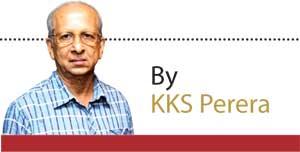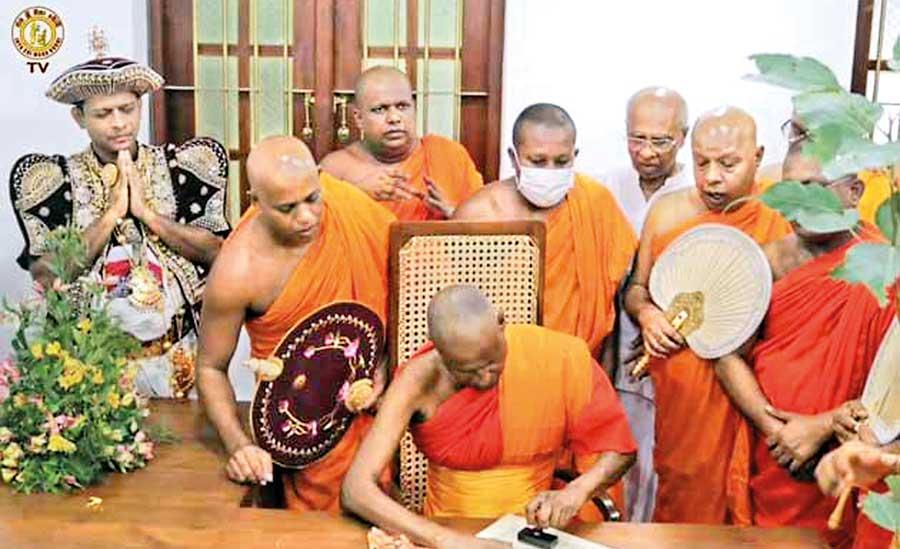Reply To:
Name - Reply Comment
Last Updated : 2024-05-18 20:50:00

Most Ven. Pallegama Hemarathana Nayaka Thero was appointed as the new Custodian and Chief Priest of the Sri Maha Bodhi and Atamasthana Adhipathi of Anuradhapura, by the Atamasthana Committee
When religion and politics integrate with each other, either politics will dominate religion or religion subordinates politics
Most Ven.. Pallegama Hemarathana Thero, who created lyrics for Karunarathna Divulgane’s ‘Atheethaya Sihinayak Pamanai sabesuvadak ne’; [loosely translated…, ‘Past is just a dream, where there is no real fragrance…, there will be no heartburns now, if didn’t bond in love then…’], was appointed as the new Custodian and Chief Priest of the Sri Maha Bodhi and Atamasthana Adhipathi of Anuradhapura, by the Atamasthana Committee.
dream, where there is no real fragrance…, there will be no heartburns now, if didn’t bond in love then…’], was appointed as the new Custodian and Chief Priest of the Sri Maha Bodhi and Atamasthana Adhipathi of Anuradhapura, by the Atamasthana Committee.
The unique and most admirable feature of the ceremony conducted on assuming duties by the new Atamasthana Adhipathi held on November 11 in front of the Jaya Sri Maha Bodhi was the conspicuous absence of politicians from both the government and opposition. Perhaps, Hemarathana Thero realised that the present pathetic state of the country was caused due to each person’s unwise ‘bonding–in-love’ with a favoured political entity, a tradition that had been foolishly passed down through generations.
However, it was a great move forward indeed, that needs to be sustained unlike the declaration made by Mahanayake theros of Malwatte and Asgiriya a few months ago, that they will not grant audiences to any politicians until and unless they unite in putting the country back on a healthy economic footing—a resolution they failed to honour, especially when ruling party’s breakaway factions were accommodated recently. The three factions, one group styled, ‘Viyathmaga’ top professionals, the other calling themselves ‘Uththara Lanka’[beyond earthly realms?] and the third SLFP [now reduced to five MPs], all three factions consist of former staunch Rajapaksa loyalists, [that included a few acolytes as well] who worked tirelessly to bring them to power, and helped them in plundering national wealth. [Some even shared the loot!]
There is ample evidence in history, that when politics is summoned to help religion, it abuses it for its own interest and makes effort to subordinate it. Whenever religion tries to interfere in politics, economy or governance, it falls into the firing line
The politicians should reciprocate the stance taken by the Anuradhapura venerable monks by refraining from engaging the clergy in the state or party events too. Let it be the first step towards separating the two and put an end to religious interference with politics or vice versa.
When religion and politics integrate with each other, either politics will dominate religion or religion subordinates politics. In case of conflict, both politics and religion use state resources and its people in acquiring power. A society would become unrestricted and free when the grip of religion is weak; it becomes sterile when religion dictates; religion embraces hostility to change: society returns to old traditions and reduces the role of innovation.
Separation of politics from religion does not make religion weak. The strength of religion lies in the confidence in its truthfulness and faith and not in auspices and sponsorship of state. There is ample evidence in history, that when politics is summoned to help religion, it abuses it for its own interest and makes effort to subordinate it. Whenever religion tries to interfere in politics, economy or governance, it falls into the firing line. Religion is not capable of accommodating changes of fast development in the natural sciences or to understand or interpret them in religious terms. Hence, in the separation of religion from politics, economy, and science and technology become vital.
Prime Minister D.S held that, “equality is a basic tenet of Dhamma. If equality is a provision, then you cannot give primacy to one religion”
The common goal of both religion and politics is to gain political power and abuse it to achieve their ambitions. However, they adopt different methods to achieve this objective. Religion rallies emotional response of people, while politics use conspiracy, scheming and tact, they even make attempts to win either democratically, or if the society permits, seize power with the help of the military, especially in backward societies. Tracing the beginning of any religion provides that religions have started focusing on finding solutions to existing problems through its teachings. However, time creates new challenges and a religion has to respond to them for its survival by adjusting its teachings accordingly, until it reaches a stage when a religion finds it difficult to respond to unique challenges and finds hard to adjust according to new situations.
There had been instances in the past, when politics and religion, both unite with each other in an effort to dominate political power or politics, after reducing and paralyzing religion; that’s where religion plays a subservient role to politics. History is not devoid of sectarian clashes among factions, leading to their separation when they appear as contenders and strive to struggle for domination.
Governor Robert Brownrigg and the Convention
On February 10, 1815 Governor Robert Brownrigg in a shrewd move, wanted to please and win over the Kandyan Chiefs and the prelates of the Malwatte and Asgiriya chapters, had invited them for discussion on the convention, where he assured them that Buddhism and its properties and places of reverence will be protected. The British colonial authorities introduced an ineffectual piece of inducement in article5, protecting their religion, and privileges. The convention stipulated that the Kingdom of Kandy would be annexed to the British Empire, giving them total control over the island.
Article 5 stated….,
‘The religion of Buddho, professed by the chiefs and inhabitants of these provinces is declared inviolable and its rites and ministers and places of worship are to be maintained and protected’. The slightly-different Sinhala version says not only the protection and maintenance of Buddhist temples but also Devagama (Hinduism) Devales or Hindu temples should be protected.
Prime Minister D.S. Senanayake’s Response to Mahanayake Theros
In 1947 December, a deputation headed by the two Mahanayake Theros and some prominent Kandyan members of the laity, met the Minister of Home Affairs, Sir Oliver Goonetilleke to seek an assurance that Article 5 of Kandyan convention of 1815 would be honoured in the presence of the Duke of Gloucester, on his visit to Kandy in February 1948, at the Kandy Audience Hall, where the treaty of 1815 was signed. They also hinted that the Mahanayakes will boycott the Independence celebrations unless their demand is included in the Independence Act, and they sought an urgent meeting with the PM.
Mahanayakes to a Private Residence
The Prime Minister, wanted the Malwatte and Asgiriya prelates, and the Diywadane Nilame, to meet him at the Government Agent’s residence to discuss the matter. Diyawadane nilame, was unfavorable to the prelates being invited into private homes and suggested that it could be held in the Dalada Maligawa. It was also decided to request that a clause recognising Article 5 of Kandyan convention is incorporated in the new constitution.
Prime Minister D.S did not visit the two temples, but met the prelates at Maligawa and convinced them of the significance of not introducing special provisions or foremost position to Buddhism in it. He held that, “equality is a basic tenet of Dhamma. If equality is a provision, then you cannot give primacy to one religion.”
D, S. Senanayake, a devout Buddhist, he did not fear religious authority. He never sought to gain popularity by abusing religion. Senanayake along with Sir Ivor Jennings, the Constitutional expert, designed the 1948 Constitution. The 1948 Constitution of Independent Sri Lanka did not give Buddhism the foremost place as done in 1972 and 1978 drafts.
Writer can be contacted at
- kksperera1@gmail.com

Most Ven. Pallegama Hemarathana Nayaka Thero assumed duties as Anuradhapura Atamasthanadipathi
Buddipala Hambanthota Tuesday, 15 November 2022 10:17 AM
It is good to keep all politicians away from all religions - they are thieves and destroyers of religions, the country and people!

Add comment
Comments will be edited (grammar, spelling and slang) and authorized at the discretion of Daily Mirror online. The website also has the right not to publish selected comments.
Reply To:
Name - Reply Comment
The state-run loss-making State Mortgage & Investment Bank (SMIB) has reveale
US authorities are currently reviewing the manifest of every cargo aboard MV
On March 26, a couple arriving from Thailand was arrested with 88 live animal
According to villagers from Naula-Moragolla out of 105 families 80 can afford
17 May 2024 - 0 - 115